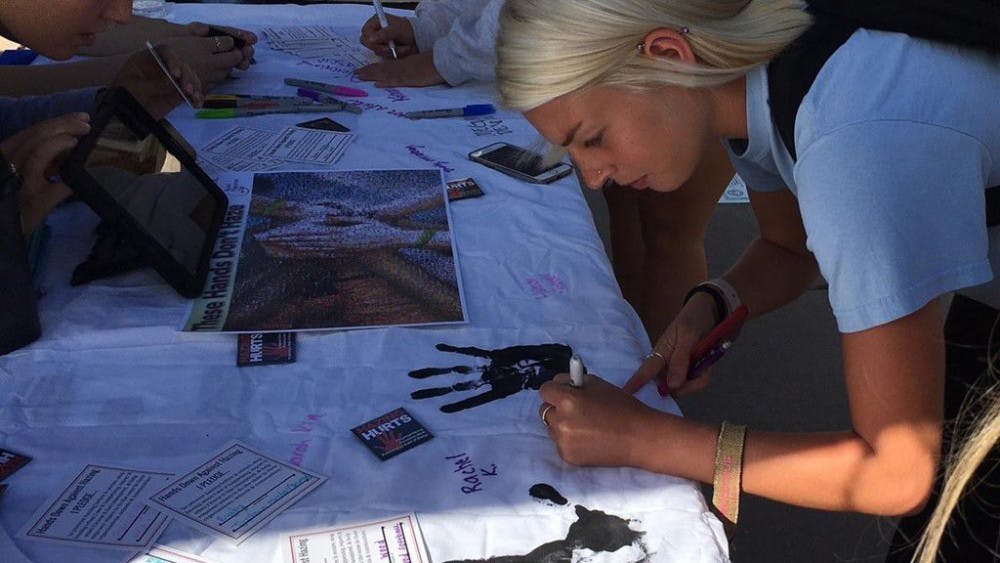
On Feb. 14, nine former fraternity brothers at Louisiana State University (LSU) were arrested and charged with hazing the pledges of their fraternity, Delta Kappa Epsilon.
Editor's note: The opinions expressed in this commentary are solely those of the author.
Greek life is a defining part of American colleges and universities and it seems almost impossible to disassociate the two. There are many misconceptions to Greek life shown in the media, such as the crowded and deafening parties with hazing requirements.
While this isn’t the case for all sororities and fraternities, there are some cases where these misconceptions still ring true and reinforce those pre-existing ideas.
Hazing may seem to be decreasing, with movements such as “These Hands Don’t Haze” becoming more and more prevalent, but there are still incidences where hazing is brought into the public eye and paints Greek life in a negative light.
On Feb. 14, nine former fraternity brothers at Louisiana State University (LSU) were arrested and charged with hazing the pledges of their fraternity, Delta Kappa Epsilon.
According to the arrest warrants, the hazing included punishments such as pouring gasoline on the pledges, forcing them to sit in an ice machine while only wearing their underwear and attempting to beat the pledges with a metal pipe.
One pledge told officials after he’d sat in the ice machine, he was told to lay on a basketball court covered in broken glass, where he and another pledge were then hosed, urinated on and attacked with milk crates.
Other hazing endeavors involved fraternity members extinguishing their cigarettes using the victims’ bodies and engaging in what Delta Kappa Epsilon members refer to as a “new boy shower” where one must stand in the shower and look up while holding a milk crate full of ice and cayenne pepper above their head, causing the water to melt the ice and the pepper to run into their eyes.
These cruel hazing allegations prompted the arrest of Charles Brakenridge (23), Blake Chalin (20), Cade Duckworth (23), Gaston Eymard (23), Shakti Gilotra (22), Joseph Harkrider (19), Malcolm McNiece (23), Alexander Rozas (23) and Garrett Sanders (21).
According to the university, Duckworth and McNiece are not students this semester.
Unfortunately, this isn’t the first time Louisiana State has made headlines for fraternity hazing. Back in 2017, 10 members of Phi Delta Theta took their hazing initiation a step too far, which resulted in pledge Maxwell Gruver’s death on Sept. 14 of that year.
Gruver was forced to drink an excessive amount of alcohol in a ritual the fraternity called “Bible Study.”



Longwood's Student-Athlete Advisory Committee (SAAC) held an anti-hazing event with the Order of Omega on Sept. 29, 2018.
Those 10 fraternity brothers were charged with misdemeanors and the Phi Delta Theta chapter at LSU was shut down. At the request of Gruver’s parents, Louisiana lawmakers strengthened anti-hazing laws.
However, it’s clear that wasn’t enough to deter other fraternities from participating in hazing and meeting the same fate.
After this keeps occurring, why does hazing continue to happen and what can Louisiana State and other universities do to further prevent it?
Hazing seems to be the rite of passage those looking to join Greek life must go through to prove their desire to be in a sorority or fraternity.
According to Georgetown University, some perceived benefits of hazing include keeping traditions intact, cultivating shared pride and weeding out those who don’t “take the process seriously.” Hazing can also be looked at as a bonding experience for new members once they emerge on the other side together.
At Longwood, there’s been a fair share of hazing busts. Back in 2011, 15 students in the Tau Kappa Epsilon fraternity were apprehended and taken into custody on hazing charges. Tau Kappa Epsilon is no longer active in Longwood’s Greek life.
More recently, in 2017, members of Delta Zeta sorority at Longwood were accused of hazing, though the details of the hazing were never publicized. The National Board made the decision to suspend Delta Zeta and put the sorority on probation until Dec. 2019.
To prevent more hazing incidents, Longwood has an enforced anti-hazing policy; each year, members of fraternities, sororities and other organizations must indicate they have read the policy outlines.
Longwood also has a hazing hotline for pledges or members that experience hazing and want to report it. The university also participates in an anti-hazing week with hundreds of other campuses across the country.
Additionally, The Office of Fraternity & Sorority Life at Longwood dedicates time to speaking out against hazing, with events such as “Hazing Does Not Fit in a Box” on Feb. 26, 2019.
It’s imperative universities take these steps to prevent and stop hazing as a whole. College Hellenism is supposed to be a positive, life-changing experience, not a life-threatening one.
Hazing may seem like it’s a traditional part of Greek life and in college, but it’s time to create more peaceful traditions and put an end to the misconceptions.
Longwood's Student-Athlete Advisory Committee (SAAC) held an anti-hazing event with the Order of Omega on Sept. 29, 2018.









